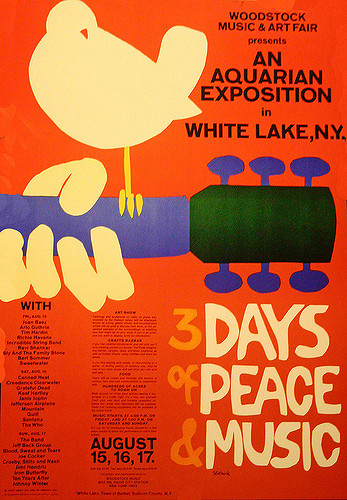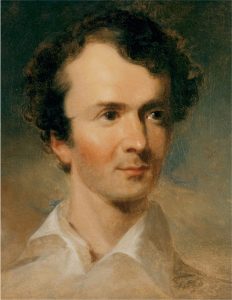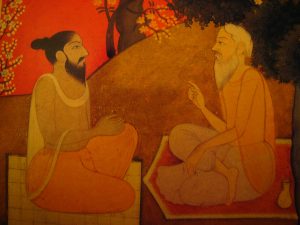The Sixties. We think of the Vietnam War, Civil Rights protests, the assassination of John F. Kennedy, the Apollo landing on the moon, hippies, Peace on Earth, and most importantly, the music. Music is how famous musicians express their thoughts and feelings to a broader audience.1 The Sixties made history through its music and more iconically, through a three-day concert known as Woodstock.

It all started with four young men that wanted to build a recording studio: John Roberts, 26-years-old, and an heir to a drugstore and a multi-million dollar trust fund; Joel Rosenman, 24-years-old, a Yale Law School graduate, and guitar player for a lounge band in Long Island and Las Vegas hotels; Artie Kornfeld, 25-years-old, a songwriter, producer, and the vice president of Capitol Records; and finally, Michael Lang, 23-years-old, and owner of a head shop that sold accessories for weed, tobacco, and other recreational drugs in Florida.2 All four men met in February of 1969 and came up with the idea of creating a rock festival, and they discussed the budget for it. They met several times after to discuss other ideas for the festival. And by their last meeting, they had a budget of five hundred thousand dollars, and were hoping for fifty thousand people to attend. Unknowingly, their “Woodstock” would become the world’s largest and most remembered Rock concert of all time.

In March of 1969, the four young men formed the Woodstock Ventures company, and each man held a twenty-five percent stake in it.3 The team now needed a location for the concert; they decided to hold the concert in a three hundred acre dairy farm in Bethel, New York, because it offered easy access from New York City, less than a mile from Route 17. And it offered electricity and water lines.4 They paid seventy five thousand dollars for the rental of the property to Max Yasgur, the owner.5 By April, Kornfeld and Lang wanted to advertise and introduce Woodstock as a place of freedom with music. They had promoters create a Woodstock image for the public. The group came up with the slogan “Three Days of Peace and Music,” because they figured, if people read “peace” in the poster, it would keep the public calm and the event free of violence. The group then hired artist Arnold Skolnick to create the image for a poster. What people thought was originally a dove on the Woodstock poster was actually a catbird, which was one of Arnold’s favorite things to draw. When Arnold finally completed the drawing for the Woodstock poster, it featured a catbird sitting on a flute along with the slogan, “Three Days of Peace and Music.” This design was approved by Woodstock Ventures. However, at the last minute, Arnold made a minor change by having the catbird stand on a guitar instead of the flute, and the poster was completed.6
Woodstock Ventures wanted the most popular rock’n’roll bands to perform at the concert. They composed contracts for each band member attending, which came with promising paychecks. They signed Jefferson Airplane for twelve thousand dollars, Creedence Clearwater Revival for eleven thousand five hundred dollars, and The Who for twelve thousand five hundred dollars.3 They had a total of thirty-two bands listed to play, including Janis Joplin, The Grateful Dead, Joe Cocker, Crosby, Stills, Nash and Young, and others. The highest paid performer was Jimi Hendrix, who signed for thirty-two thousand dollars. Hendrix would be the last act to perform and he famously closed the festival with his version of the “Star Spangled Banner,” which has gone down in history as one of the greatest performances of his career.8 Woodstock Ventures paid a total of one hundred and eighty thousand dollars for all the musicians who performed in the concert. Lang made the decision that he did not care what it would cost to get a rock band to perform for Woodstock. They would pay the deposit and create the contracts at whatever cost to ensure that they had the best performers.
By the spring time, advertisements for Woodstock started appearing in the New York Times and on radio stations across the country.9 While Woodstock Ventures had originally expected fifty thousand people to attend the festival, they sold a total of one hundred and eighty six thousand tickets, costing six dollars per day.10 In August, one week before show time, Kornfeld wanted to capture the stories of the people, their thoughts about Vietnam War, and their thoughts about Woodstock. Kornfeld made an offer with Warner Brothers to document the festival. Woodstock Ventures paid one hundred thousand dollars to have the festival filmed, and a contract was signed agreeing that if the film made it big they would get paid double the amount, and if it failed they would get nothing.
On August 14, 1969, the day before the festival, early in the morning, Woodstock Ventures noticed that traffic was backed up ten miles long on Route 17, and they were shocked to see that so many people were attending. An estimated twenty five thousand people were already waiting before the festival began.11 The four young men knew this concert was going to be amazing, but they never thought that it would go down in history as one of the biggest and “the greatest peaceful events in history,” as Time magazine called it.12

Throughout the years many attempts to recreate another Woodstock have failed. The Woodstock of 1969 will forever go down in history for its great music, the psychedelic people, and most importantly, a once in a lifetime event that can never be forgotten.
- Alan Brinkley, American History: Connecting with the Past Volume 2 (New York: McGraw-Hill Education, 2014), 812-813. ↵
- “How Woodstock Happened,” reprinted from The Times Herald-Record, 1994. http://www.edjusticeonline.com/woodstock/history/index.htm. (accessed November 17, 2016). ↵
- “How Woodstock Happened,” reprinted from The Times Herald-Record, 1994. http://www.edjusticeonline.com/woodstock/history/index.htm. (accessed November 17, 2016). ↵
- “Woodstock Music Festival.” History.com, 2009, http://www.history.com/this-day-in-history/woodstock-music-festival-concludes. (accessed November 10, 2016). ↵
- “How Woodstock Happened,” The Times Herald-Record Woodstock Commemorative Edition, 1994, http://www.edjusticeonline.com/woodstock/history/index.htm. (accessed November 17, 2016). ↵
- “How Woodstock Happened,” The Times Herald-Record Woodstock Commemorative Edition, 1994, http://www.edjusticeonline.com/woodstock/history/index.htm. (accessed November 17, 2016). ↵
- “How Woodstock Happened,” reprinted from The Times Herald-Record, 1994. http://www.edjusticeonline.com/woodstock/history/index.htm. (accessed November 17, 2016). ↵
- Spencer Bright, “Forty far-out Facts you never knew about Woodstock,” Daily Mail, August 7 2009. ↵
- “How Woodstock Happened,” The Times Herald-Record Woodstock Commemorative Edition, 1994, http://www.edjusticeonline.com/woodstock/history/index.htm. (accessed November 17, 2016). ↵
- Daily Mail, August 2009, s.v. “Forty far-out Facts you never knew about Woodstock,” by Spencer Bright. ↵
- “How Woodstock Happened,” reprinted from The Times Herald-Record, 1994. http://www.edjusticeonline.com/woodstock/history/index.htm. (accessed November 17, 2016). ↵
- Daily Mail, August 2009, s.v. “Forty far-out Facts you never knew about Woodstock,” by Spencer Bright. ↵



75 comments
Sarah Mares
Music has always been of important value to me and attending music festivals is something I absolutely love to do, so I knew this article would immediately draw me in. I have heard the great tales of ’69’s Woodstock and think of it as the pinnacle of music festivals. This article was great in explaining how Woodstock came about and the success and impact it would leave on the music industry for decades to come.
Richard Navarro
The vibe from Woodstock is still longed for till this day. Its awesome to see that people came together for peace during such tough times in the United States. Aurora, you are an excellent writer and I am very interested in the articles you write. Who would have known that Woodstock was founded by a group of four young men who wanted nothing more than peace and music.
Faisal Alqarni
Hi Auorora this was a nice read, its evident that the four young men were very passionate about the Woodstock event and this translated into the outcome of the concert since as you say the concert was totally sold out and remains a benchmark to this day on how a great show should look like. I think presently the only other show that could come close to this would be the Tomorrow land shows, but I think the common theme of peace of the Woodstock concert transcends time and space making it an icon from an era when war raged and many other firsts occurred.
Briana Bustamante
Great article. You did a great job researching the four Woodstock creators. The information was well written and presented in a clear manner. It’s incredible that such a simple concept of music and peace could turn out to be so historical. I had always heard of Woodstock but did not fully understand the magnitude nor the impact that it had on the History. Thank you for choosing this topic. Excellent work!
Luke Trevino
Wow this was honestly one of my favorite articles I loved every piece of it! I believe it is because I love music and appreciate the peace it brings. I strongly believe that this was one of the biggest peaceful events ever and that it can’t be recreated. It can’t be recreated because it happened in a time of great sadness to were society as a whole craved peace. Overall amazing job!!!!
Alyssa Vela
When I saw the title of the article, I assumed that it would be an article focused on the Peanuts character, the woodstock. I was so wrong, but I’m glad that I was. I had prior knowledge of the Charlie Brown character, but didn’t have any prior knowledge of the music festival. I think it’s amazing how something as simple as a music festival was able to bring so many people together in harmony. Overall this article was not something I expected for obvious reasons, but I really did enjoy reading it. I loved how in detail you were from start to finish.
Mario Sosa
I have not heard much about Woodstock ’69, only that it was an event where famous musicians performed. I find it to be incredible how much attention it got and how much went into setting up the event. The cultural change during the late sixties was highly reflected in its music so I can see why it got a lot of attention. Outstanding article, good job.
Gabriela Medrano
This article was so legit! I loved it. Who would have thought that this Woodstock show would mark history of music, peace, and rock forever. Very detailed story, from the people involved to the money contributed to the show, which was lots! I did not know the background story to this show, you hear more of the musicians and performers rather than the creators themselves. Thanks to these four successful young men people were able to reunite and leave all differences aside in peace and make the 60’s that much better.
Alyssa Valdez
Very interesting read! I think it’s fascinating that so many people from all over the country came together as one to celebrate music. Even though there was many downfalls from Woodstock I believe this is a very important part to music industry and music history. Although I’ve never been to a music festival or a concert I have always wanted to attend one, I believe events like this are great ways for people to connect with one another and celebrate music!
Sam Vandenbrink
Great read! learned allot about the music festival and how music effected history. Woodstock is one of those things people don’t forget about because of how influential it has been on history. They defiantly had the most popular rock n roll bands of there time performing at the concert! Its nice to learn about where music started to take off in an entirely different direction.